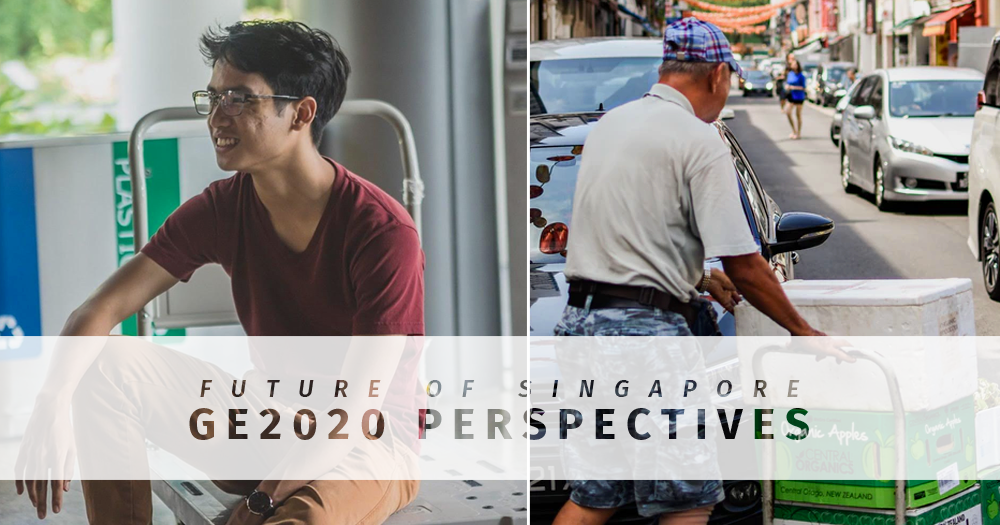FUTURE OF SINGAPORE: GE2020 PERSPECTIVES
Are there grounds for a young Singaporean to be optimistic about post-Covid-19 Singapore?
We invite Singaporeans to share their hopes and anxieties for our future, including their thoughts on leadership and pressing social issues that are close to the hearts of the younger generation.
22-year-old Yale-NUS College student Nur Hazeem Bin Abdul Nasser shares his hopes on how Singapore can be more inclusive given how there are different lived experiences, and how it is important for people to feel like they belong.
By Nur Hazeem Bin Abdul Nasser
Uncle sits on the ramp with a bag filled with tissue paper packets. His weary eyes quickly scanning the walkway for potential customers and hands in open gesture to invite sales.
He intentionally positions himself at a spot between the bus stop, the mall and the MRT, knowing that people will inevitably see him. However, despite the high visibility, he is easily ignored.
An invitation to curious stares, looks of pity and sometimes, occasional conversations.
“Business not good luh. Circuit Breaker I cannot go out earn money and now no one willing to interact and buy anymore—except my regulars,” he laments, sighing heavily.
“Gahmen has quite a lot going on with Covid-19 and elections, cannot blame them. Now is the best time…they need the mandate. After this should be better.”
Despite what he may think, I find that Uncle is actually quite familiar with current affairs and the ongoing political developments. His son helped him install a phone app to read news and keep tabs on the latest GRC developments.
“Must study hard ah, or later become like Uncle. But I happy luh—see you every week.”
It is conversations like these that expand my view on the range of hopes, fears and concerns that individuals may have.
“Jialat eh, a lot of foreign workers taking jobs. Lost mine before I start driving. Then now, the company cutting our incentives. Have to work so much harder to earn my previous month’s pay. Or else how to feed my family?”
I sit in the backseat of the taxi listening to the driver talk about the corporate structure of private hire companies, along with insufficient government aid to the industry. When I asked if he had eaten, his eyes softened and he mentioned dinner would be eaten at home, as his wife was cooking.
Jobs are a prominent topic, unsurprisingly, with many mentioning livelihood concerns as well as ‘bread and butter’ issues. Even amongst youths, anxieties about internships and early career development run high. The shock of a recession sends ripples through the economy, displacing people. Many are left lost.
Yet, underlying these macro trends of unemployment, political transition and discussion of government initiatives, there is an individual’s desire to be heard. To be validated and to belong. Social media has been abuzz with loud rhetoric and party-pledging. Voices talk over one another.
The election period has resulted in a diversity of opinions gaining prominence, with online and offline rhetoric capitalising on the confusion to sway any swing voters.
But like many other things, opinions are always shaped by an individual’s lived experiences. The process of growing up, embracing struggle and interacting with those around you will shape your worldview.
Conversations have always been a medium for understanding—a connection between two individuals to share perspectives.
There are many whose lives have never followed the dominant narrative of ‘humble beginnings’ to ‘role model’. They have never experienced what it was like to ‘achieve success through hard work’. For them, every day is simply a challenge to survive: Who will feed my son? Can I get to a good school? My teh-o price increase leh.
These are the valid concerns that have arisen from actual lived experiences.
Social media, a platform often touted as the youth’s domain, is key in facilitating such conversations. Parties that are able to capitalise on this space often seem to capture youth attention.
Yet, at the same time, this space can seem to be shrinking as louder voices drown others out. A recalcification of echo chambers, built by instinctual walls because it hurts too much to constantly shout.
Young or old, people want their concerns validated, their voices heard and—ultimately—their wholeness seen. In real life or on social media, these fundamental human needs are constant and inviolable.
Debates skew into zero-sum games where there are winners and losers.
Conversations are a process of learning, not talking over one another and proving one’s intellectual/moral superiority. A process of invitation and withholding judgement.
No one can claim that their lived experience is true for everyone else. No platform has a monopoly on truth.
We have to critically examine the narratives put out by media platforms, and form our own conclusions on whether we agree or disagree.
Singapore isn’t perfect. But my hope is that space can be held to sustain difficult conversations, even if they are uncomfortable and painful. That laying bare our vulnerabilities are not seen as weakness, but strength.
The honesty of opening up makes one susceptible to be taken advantage of, but the hope that our words will be read kindly needs to be kept alive, burning bright.
A warm candle that sheds light on narratives less seen like Uncle and the driver, and a space in open gesture that welcomes all.
“We’re all in the gutter and some of us are looking at the stars.” ~Oscar Wilde
About the author: Hazeem is the co-founder of ALittleChange, a non-profit advocating for active youth citizenry. He has since started a new non-profit, The Signpost project, which aims to nurture relationships and articulate individual stories of tissue peddlers in Singapore.
Have an interesting perspective to share or a commentary to contribute? Write to us at [email protected].
Top photo contributed by author, photo via Unsplash.
If you like what you read, follow us on Facebook, Instagram, Twitter and Telegram to get the latest updates.
